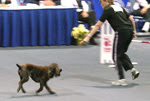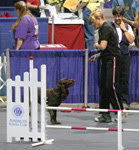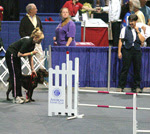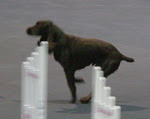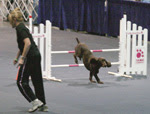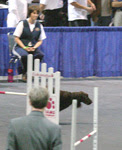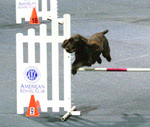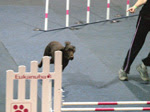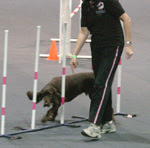Well, it wasn’t quite a clean run on the second run of the day for Debbie and Mo’i: two faults and a not-so-wonderful score, though still good enough to put them in the middle of the pack.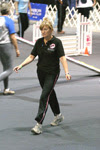
If you’re not familiar with agility competition, some of what goes on there might seem mysterious. Perhaps even odd! At right is a photo of Debbie during the “walk-through”. This isn’t some sort of bizarre ceremony. Rather, it is the only chance that the handlers have to experience the course before they run with their dogs. Every agility course at every meet is different — the obstacles are set up in a different pattern, with a different path required through them. The judge designs the course, generally with a mix of straightforward and challenging elements. The challenges can include very tight turns, complicated patterns that are difficult for the handler to guide a dog through, distracting “trap” obstacles that try to lure the dog off the correct path, and more. The handler gets a map of the course on the day of the run, and that’s certainly useful in a general way. Most useful would be to have some practice runs on the actual course — but part of the challenge of this sport is that when a dog runs the course, it is the very first time that dog has ever run that course. So no practice runs. That leaves the walk-through, where the handler gets to walk through the course following the prescribed route, visualizing all the twists and turns they’ll be making as they run through it with their dog. Some handlers simply walk the course, watching, visualizing, and imagining. Other handlers actually run the course themselves, with an imaginary dog accompanying them, giving all their hand signals and shouting commands as they run. Most handlers are somewhere in between those two extremes. Nearly all the handlers are intensely focused — as you can see Debbie is — during this walk-through. A good walk-through is a key part of success on the run.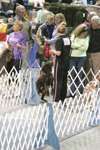
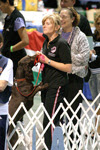


At any given moment during the actual competition, there’s only one handler and one dog (and the judge, of course) on the course at any given moment. Debbie and Mo’i are running with the 20 inch dogs (this refers to the height that they jump), and in this meet there were over 80 dogs in their group. Each run takes around 45 seconds or so to complete — so if there are no delays at all between dogs, the entire group can run in about an hour. To keep the efficiency high, there are always several handlers and dogs waiting in line just before the starting point. If you’re competing, you enter this line and advance one step each time one of your competitors makes their run. It’s interesting to watch the people waiting in this line. Some of them spend the entire time observing and studying the runs, presumably trying to learn some lessons for their own run. Some of the handlers look nervous or worried; others look completely at ease (and I was happy to see that Debbie was in the latter group). Many of the handlers play with their dogs, trying to get them comfortable or revved up, or focused. This series of pictures shows Debbie and Mo’i in that waiting period, in chronological order from left to right. They both look relaxed, happy, and a bit excited…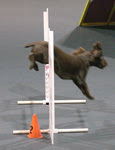

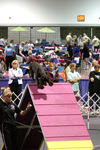
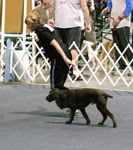
And here’s the run! On this first part of their run, everything looked fine, though it was clear that Mo’i wasn’t zippy. This is one of the big challenges of training a field spaniel for agility: to get your dog to move through the course in a highly motivated fashion. This sort of focused, directed, intense activity doesn’t seem to come naturally to a spaniel like it does to, say, a border collie. This is something a field spaniel has to work on, and seems to have to be in the right mood for. Certain things seem to help (practice, a relaxed handler, cool temperatures, rough play, hunger and the resulting eagerness for treats), but even in the presence of all these things, a field spaniel might just decide not to be zippy. And that’s apparently what Mo’i decided on this run…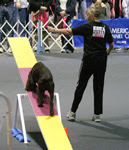
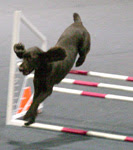
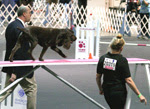
The elevated walk was the last thing before the first fault. You can see the judge to Mo’i’s left as he trots down the elevated walk, and Debbie is on his right. Coming off the elevated walk, what Mo’i was supposed to do was make a near 180 to the right and jump over the triple jump you see him clearing in the next photo. What he did instead was to turn right about 90 degrees and jump over a single jump that he wasn’t supposed to go over. Debbie got him turned around and back over the correct jump, but still there was the “fault” — plus the correction cost two or three precious seconds. Debbie tells me that she believes she could have done a better job with her signalling at the end of the dog walk; she thinks that Mo’i just didn’t understand her direction. Right after that triple jump there was a tunnel obstacle (not in any photo), which Mo’i normally will rocket through. Not this time — he just sort of trotted through, casually. Next was the teeter, where he came to a complete stop right at the pivot, waiting for it to tip down. For speed on the teeter, it’s essential for the dog to walk (or run) right over the pivot to put some weight onto the high side. Despite Debbie’s signaling, Mo’i didn’t budge off that center until the the teeter was down, costing several more seconds. I’m sure Debbie made a mental note here, that she needs to work more with Mo’i on the teeter. In the end, they were a few seconds over the course time — which is another “fault", and another deduction on the score.
I just got off the phone with Debbie — she and Mo’i finished their first run for today, with good news and bad news. The good news was that Mo’i was very happy and zippy, barking and scampering all the way around the course. The bad news: two faults. Mo’i dropped a bar on a jump, and Debbie says that near the end of the run she failed to direct him properly, and Mo’i ended up going over the wrong obstacle. Debbie’s not sure what this does to her scoring (or a shot at the finals) — the scoring at this meet is unusual, and while this performance woudl disqualify them in an ordinary meet, she’s not certain it will here. We’ll just have to wait and see on this one…














